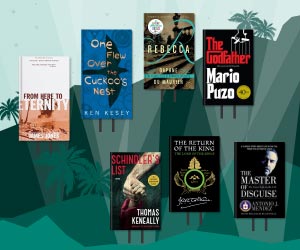Around the World in Eighty Days
(Part of the Extraordinary Voyages (#11) Series and The Extraordinary Voyages (#11) Series)
Around the World in Eighty Days is a classic adventure novel by the French writer Jules Verne, published in 1873. In the story, Phileas Fogg of London and his newly employed French valet Passepartout attempt to circumnavigate the world in 80 days on a 20,000 wager ( 7,578,192.00 today) set by his friends at the Reform Club. It is one of Verne's most acclaimed works. Around the World in Eighty Days was written during difficult times, both for France...
Format:Paperback
Language:English
ISBN:1535590157
ISBN13:9781535590150
Release Date:July 2016
Publisher:Createspace Independent Publishing Platform
Length:138 Pages
Weight:0.43 lbs.
Dimensions:0.3" x 6.0" x 9.0"
Customer Reviews
4 ratings
The Language Itself is a Destination
Published by Thriftbooks.com User , 15 years ago
This book was originally published as episodes in Le Temps in 1873, and they became an immediate sensation. And in a case of life imitating art, the episodes' actual readers wagered on the outcome. The story has protagonist, Phileas Fogg, an English gentleman of comfortably sedentary habits, making a spontaneous wager with other members of his club as to his ability to circumnavigate the globe in eighty days or less. Mind you, the first steam-powered vessel had been launched only thirty years earlier, and steam was still considered auxiliary to sail power. Dependence on the wind for powering ships made the timing of arrival dates quite iffy, and multiple rail and ship connections were a certain source of delay and frustration. For a gentleman to wager what amounted to half of his life savings on the complete avoidance of such delays would have, in those days, amounted to lunacy. It was only with some difficulty that Fogg prevailed on his wagering counterparties to take the bet, since they too were gentlemen. With twenty-twenty hindsight, many of these late nineteenth century science fiction stories look remarkably droll, and for a modern reader to share the excitement of the original audience, something akin to science fiction is absolutely essential - transporting ourselves back 136 years. Imagine being a resident of a small town anywhere in Europe, and being suddenly hoisted by the power of compellingly written fiction to the back of an elephant in the Indian jungle. Imagine strolling around the streets of Yokohama and joining a band of wandering performers. Imagine fighting off Sioux warriors from the windows of a speeding train. Perhaps imagining being accosted by a Mormon missionary wouldn't be quite so difficult for the modern reader, since that, at least, hasn't changed since the author's day. But it is not only science, and not only geographic and cultural literacy which has advanced over the intervening century. The craft of fiction has advanced to the point that Jules Verne's narrative in a streaming passive voice makes the book seem antiquarian to a degree that its archaic world view doesn't. The reader willingly suspends disbelief regarding character and plot, but more than an occasional abuse of the passive voice is difficult for the modern reader to accept. It dates the book in a way that the headlining of steam power doesn't. The reason, though, that the story survives in our imaginations is Jules Verne's exceptional ability to create and maintain tension from page to page. Phileas Fogg gets two days ahead of his schedule, and we eagerly anticipate the setbacks which we know must thwart his program. He gets two days "behindhand," becomes separated from his travelling companions, and we churn with anxiety lest he miss his next critical connection. The careful reader will find facts and figures which date the book, and only add to its charm, e.g., "Everybody knows...that India has a population of one hundred an
Jules Verne's Guide to Successful Project Management
Published by Thriftbooks.com User , 16 years ago
I just read Around the World in 80 Days by Jules Verne. Besides a great book and a fun read, I found there to be a number of principles in there that are useful for managing and executing any project or undertaking. Without giving away too much of the book if you haven't yet read it, here it goes: 1) Singleness of purpose: Phileas Fogg had one goal in mind. It was not to tour the world and learn about new cultures. It was to win the bet with the Reform Club that he could circumnavigate the globe in 80 days or less. Granted he may have missed out on some chances to learn a new language or receive insight into the way others live, but that was not his goal and he knew it. 2) Availability of resources: It's true that money can't buy you love but it can buy a heckuva lot of other things! Having the cash that he did bailed him and Passapourt out of many a jam throughout their adventure. You should always count the cost before taking on any venture in terms of financial and human resources. 3) Keep a cool head: If Phileas Fogg was nothing else it was unflappable, composed, self-possessed, and cool-as-a-cucumber. No matter what the obstacle, he never lost his composure. Bringing a project in on time and within budget means dealing with all of the issues that come up with coolness, logic, and good decision-making. 4) Openess to risk: Phileas Fogg was willing ot risk his entire venture to save the woman Auoda from death. He was not reckless, however! He was able to work himself into a position to take this risk by getting ahead of schedule where he could afford to try and save the woman. Success in this venture leads to one of the greatest benefits of the entire voyage although he does not know it at the time. 5) Expect the unexpected: Early in the tale when confronted with all the uncertainties involved in his proposed endeavor, Phileas states simply that "The unforeseen does not exist." What he means is that every roadblock can be anticipated with enough foresight. Likewise, we can use careful planning to mitigate many of the possible pitfalls for any given project we undertake. A great exercise would be to have your young reader (11 or older) read the book and see if they can pull any of these principles out and use it as a discussion starter. Enjoy Jules' fun classic of adventure!!
Concise Yet Absorbing
Published by Thriftbooks.com User , 19 years ago
Mr. Verne was a highly imaginative writer in his time and aptly regarded the founder of modern science fiction. Although the ending is sentimental to my taste, the whole story grabs my attention. It is told in a condensed and simple nature thus great for a bedside read to children of all ages. Phileas Fogg is a unique character who is eccentric but exceedingly predictable in kindness. Passepartout is as clear as day, a typical madcap. His thoughts are hilarious as his overall personality. Wherever it is clarified during their expedition, the details are colorful with facts, suspense, and riddles that make up a wonderful voyage. A lot is a passing comment but that is alright because the narrative is stimulating. The fiction lacks dialogues especially for the ever charming, Mrs. Aouda. The police officer is formed into a truly disciplined servant of the force. It is a fast read that concludes with uncomplicated turn of events.
Excellent Book
Published by Thriftbooks.com User , 24 years ago
This is a book that I read when I was young boy, and I always thought that it was a fantastic story for children to read. It stimulates their thinking and certainly creates all kinds of imaginations. I totally recomend this books for those children that like some adventure in their readings. Unfortunately, the thrill of this book is threatened with the easy access we now have to the WWW. It is no longer necessary to go around the world in 80 days, but it could easily be done in 80 seconds! ...and still arrive early to win the bet. Tamer
Around the World in 80 Days Mentions in Our Blog

How Many Best Pictures Were Based on a Book?
Published by Amanda Cleveland • March 21, 2024
With Oppenheimer's recent Oscars win, we had a question: How many Best Picture winners were based on a book? Countless classic films are adaptations, as if a great story tends to start in literature. Let's look at the numbers and the amazing books that have lead to great films.






